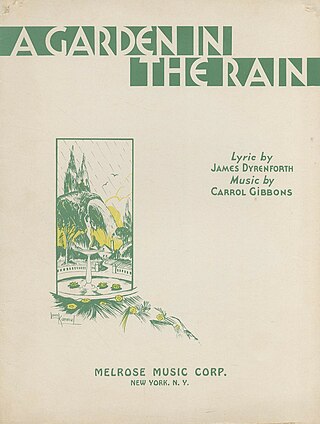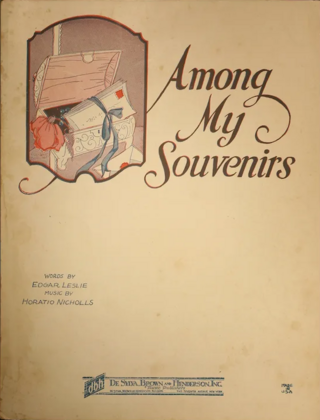"How High the Moon" is a jazz standard with lyrics by Nancy Hamilton and music by Morgan Lewis. It was first featured in the 1940 Broadway revue Two for the Show, where it was sung by Alfred Drake and Frances Comstock. In Two for the Show, this was a rare serious moment in an otherwise humorous revue.
"Blues in the Night" is a popular blues song which has become a pop standard and is generally considered to be part of the Great American Songbook. The music was written by Harold Arlen, the lyrics by Johnny Mercer, for a 1941 film begun with the working title Hot Nocturne, but finally released as Blues in the Night. The song is sung in the film by William Gillespie.
"Blue Room" is a show tune from the 1926 Rodgers and Hart musical The Girl Friend, where it was introduced by Eva Puck and Sammy White. It is also a jazz standard.
"Love Me or Leave Me" is a popular song written in 1928 by Walter Donaldson with lyrics by Gus Kahn. The song was introduced in the Broadway musical comedy Whoopee!, which opened in December 1928. Ruth Etting's performance of the song was so popular that she was also given the song to sing in the play Simple Simon, which opened in February 1930.
The popular song "Moon Over Miami" was written in 1935 by songwriters Joe Burke and Edgar Leslie. The music was used in the 1941 film Moon Over Miami being played during the opening credits and also played as dance music at both parties.
"So in Love" is a song by Cole Porter from his 1948 musical Kiss Me, Kate, which is based on Shakespeare's The Taming of the Shrew.
"Forever and Ever" is a popular song, from a German song, "Fliege mit mir in die Heimat" written by the Austrian songwriter Franz Winkler. It was adopted by the German Luftwaffe as their song during World War II. The English lyrics were written by Malia Rosa in 1948. It was originally recorded by Gracie Fields with Robert Farnon's Orchestra on 23 October 1948 and released on Decca F9031. Her version was subsequently released in the USA on London 362 and it charted briefly in 1949.
"Mule Train" is a popular song written by Johnny Lange, Hy Heath, Ramblin' Tommy Scott and Fred Glickman. It is a cowboy song, with the singer filling the role of an Old West wagon driver, spurring on his team of mules pulling a delivery wagon. As he goes about his work, the driver mentions the various mail-order goods he is delivering to far-flung customers. "Mule Train" was originally recorded by Ellis "Buz" Butler Jr. in 1947. Butler was the original writer of the song along with Fred Glickman. The original recording was released by Buz Butler on Decca Records.
"I Dream of You (More Than You Dream I Do)" is a popular song.
"Sometimes I'm Happy" is a popular song. The music was written by Vincent Youmans, the lyrics by Irving Caesar. The song was originally published in 1923 under the title "Come On And Pet Me," with lyrics by Oscar Hammerstein II and William Cary Duncan.

"A Garden in the Rain" is a popular song. The music was composed by Carroll Gibbons, the lyrics by James Dyrenforth. The song was published in 1928. The song was first recorded by the composer, Carroll Gibbons with the Savoy Hotel Orpheans and vocals by George Metaxa, in July 1928.

"I Found a Million Dollar Baby (in a Five and Ten Cent Store)" is a popular song.
"Love Walked In" is a song composed by George Gershwin, with lyrics by Ira Gershwin. The tune was composed in 1930, but the lyric was not written until 1937, for the movie musical The Goldwyn Follies (1938), where it was sung by Kenny Baker. Hit versions include Sammy Kaye (1938), The Hilltoppers (1953), Ella Fitzgerald (1959), The Flamingos (1959) and Dinah Washington (1960). Artie Shaw recorded the song in the early 1940s.
"Lies" is a popular song with music by Harry Barris and lyrics by George E. Springer. It was published in 1931.
"More Than You Know" is a popular song, composed by Vincent Youmans with lyrics by Billy Rose and Edward Eliscu. The song was published in 1929.
"That's My Desire" is a 1931 popular song with music by Helmy Kresa and lyrics by Carroll Loveday.
"I Don't Know Why (I Just Do)" is a 1931 popular song.

"I'm Always Chasing Rainbows" is a popular Vaudeville song. The music is credited to Harry Carroll, but the melody is adapted from Fantaisie-Impromptu by Frédéric Chopin. The lyrics were written by Joseph McCarthy, and the song was published in 1917. It was introduced in the Broadway show Oh, Look! which opened in March 1918. The song was sung in the show by the Dolly Sisters. Judy Garland sang it in the 1941 film Ziegfeld Girl. It was subsequently sung by Jack Oakie in the 1944 film The Merry Monahans and was again featured in the 1945 film The Dolly Sisters (1945), where it was sung by John Payne. It was also included for part of the run of the 1973 revival of Irene. Additionally, the pre-chorus would not have been included until later covers in the 1940s, where the song would gain its iconic libretti.

"Among My Souvenirs" is a 1927 song with words by Edgar Leslie and music by Horatio Nicholls.
"Let's Put Out the Lights (and Go to Sleep)" is a popular song by Herman Hupfeld, published in 1932. It was introduced by Lili Damita in the Broadway revue George White's Music Hall Varieties (1932) with the initial title "(Let's) Turn Out the Lights and Go to Bed", and hit versions that year were by Rudy Vallée, Paul Whiteman (vocal by Red McKenzie) and Ben Bernie.




